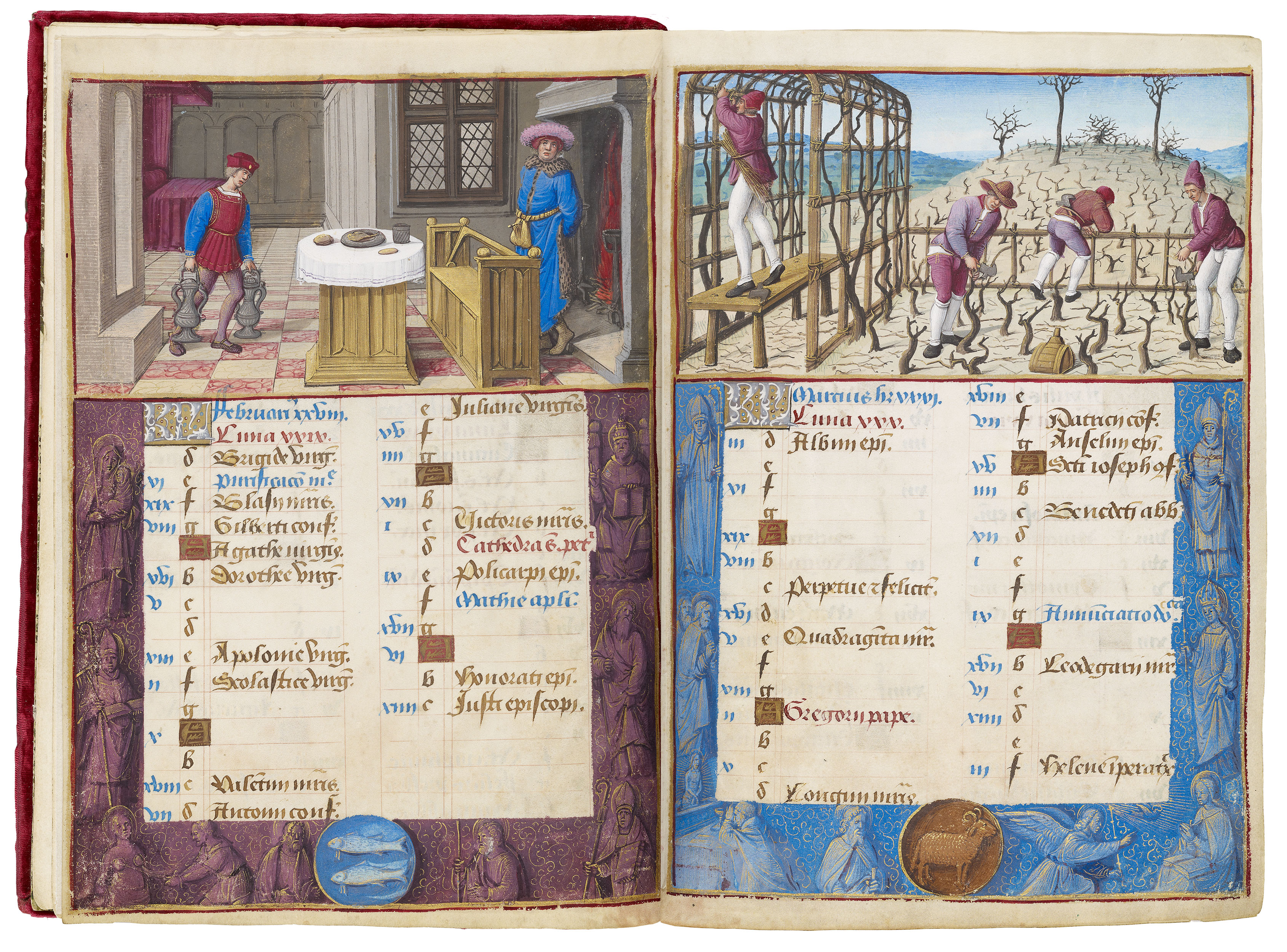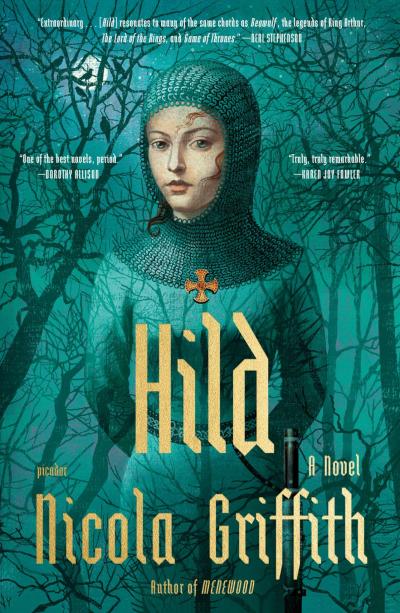Can't decide what to listen to or to read? Let our graduate help you!
If you are like me, the end of one month and the beginning of another comes with the familiar ritual of glancing at the calendar and thinking, Who allowed me to agree to all of these activities? If this were Tours, France, circa 1500, my schedule would be far simpler. As depicted in the Hours of Henry VIII, illuminated by Jean Poyer, February was a month dedicated to one primary goal: keeping warm. In the manuscript, a lord sits in fur-lined garments by a roaring fire while a servant brings the only other necessities, wine and good company.
Lacking a grand estate, loyal attendants, or flagons of wine, I settled for tea and fuzzy socks. But February has come and gone, and with a new month comes a new labor. March calls for shaking off the winter hush, pulling on our driest boots, and stepping into the garden. In medieval illuminated calendars, March is often represented by laborers pruning vines and preparing for spring. If I had a vineyard, I would be out there trimming, tying, and getting everything ready for the growing season.

For complete information and images of Henry VIII’s Book of Hours see The Morgan Library and Museum here: Hours of Henry VIII
Alas, no vineyard awaits me, so I must find another way to occupy myself. Fortunately, whether you are still in the stage of staying warm and cozy or ready to get out and garden, there are plenty of excellent books, podcasts, and blogs to explore this month. Here are some of the best new recommendations to keep you inspired without needing to pick up a pair of pruning shears (or even while you're shearing away)!
Podcasts
Professor Sara Butler from OSU’s History Department, along with Professors Krista Kesselring of Dalhousie University in Halifax, Nova Scotia, and Katherine D. (Cassie) Watson of Oxford Brookes University, co-author a blog titled Legal History Miscellany.
You can visit the blog here: Legal History Miscellany.
Legal History Miscellany is a collaborative space where these three scholars explore various aspects of legal history, crime, and justice, with a particular focus on the British context. While they approach their work from diverse fields such as social history, the history of women and gender, and the history of medicine, their research often returns to sources produced by legal processes and the ways people engaged with these processes throughout history.
The blog serves as an outlet for the scholars to share intriguing archival discoveries that did not make it into traditional publications, summaries of their published work, updates on ongoing research, and occasional musings that might spark interest beyond the academic sphere. With the goal of posting at least once a month, the blog covers a wide range of fascinating topics, including marriage, poisoning, punishments, whales, canon law, and much more.
If these subjects intrigue you, the authors welcome engagement through comments on their posts and on Twitter at @legalmiscellany. They look forward to connecting with fellow enthusiasts of legal history and beyond.

“Gone Medieval” is a favorite among the Nouvelles Nouvelles writers! Their most recent episode “Is the Renaisance a Myth?” can be found wherever you listen to your podcasts!
In this episode Dr. Eleanor Janega reveals the darker side of the Renaissance with Dr. Ada Palmer, challenging the notion that it was a golden age, exposing it as a period of political instability, medical decline, and relentless power struggles. From the propaganda of the era to the destructive reign of Renaissance popes, Eleanor and Ada hugely enjoy dissecting the complexities and darker realities that belie the glorified stories of the Renaissance while contrasting it with the misconceived 'dark' Middle Ages.
You can listen to this and other episodes here: Episodes
(Description was taken from their website)
Books
With the recent release of Rebecca Yarros’ Onyx Storm the taste for ‘romantasy’ or the crossover of romance and fantasy is bigger than ever. In contrast I thought I might recommend two books whose focus is not love.
The first is Hild by Nicola Griffith.

“Hild is born into a world in transition. In seventh century Britain, small kingdoms are merging, usually violently. A new religion is coming ashore; the old gods are struggling, their priests worrying. Edwin of Northumbria plots to become overking of the Angles, ruthlessly using every tool at his disposal: blood, bribery, belief. Hild is the king’s youngest niece. She has the powerful curiosity of a bright child, a will of adamant, and a way of seeing the world – of studying nature, of matching cause with effect, of observing her surroundings closely and predicting what will happen next – that can seem uncanny, even supernatural, to those around her.
She establishes a place for herself in court as the king’s seer. And she is indispensible – unless she should ever lead the king astray. The stakes are life and death: for Hild, her family and loved ones, and for the increasing numbers of those who seek the protection of the strange girl who can read the world and see the future.
Hild is a young woman at the heart of the violence, subtlety, and mysticism of the early medieval ageall of it brilliantly, and accurately, evoked by Nicola Griffith’s incandescent prose. Working from what little historical record is extant, Griffith has brought a beautiful, brutal world—and one of its most fascinating, pivotal figures, the girl who would become St. Hilda of Whitby—to vivid, absorbing life.”
Nicola Griffith is the author of nine novels, including Hild, Spear, and Menewood. In addition to her fiction and nonfiction (New York Times, Guardian, Nature, New Scientist) she is known for her data-driven 2015 work on bias in the literary ecosystem and as founder and co-host, with Alice Wong, of #CripLit. Awards include the Los Angeles Times Book Prize, Society of Authors ADCI Literary Prize, two Washington State Book Awards, the Premio Italia, Nebula, World Fantasy, and Otherwise awards, and six Lambda Literary Awards. She holds a PhD from Anglia Ruskin University, is married to writer Kelley Eskridge, and lives in Seattle where in 2024 she was inducted into the SFF Hall of Fame.
(Biography and description taken from Author’s website)
Interested in purchasing from a local store? Purchase Book

If you want something less saintly and a little more horror, I recommend Christopher Buehlman’s Between Two Fires.
“The year is 1348. The Black Death ravages France, leaving fields and rivers choked with unburied dead and causing whole towns to disappear. Thomas, a disgraced knight, roams the land with a band of thieves, living by the sword; when they encounter an orphaned girl in a dying village, Thomas has just enough humanity in him to save her from his colleagues. No ordinary child, this girl sees angels and talks to the dead. She tells Thomas that Lucifer and the fallen angels have risen in a new war on Heaven, that the kingdoms of men have fallen behind the lines of battle, and that he must now shepherd her on a holy quest to tip the scales in favor of good. Between Two Fires invites you on a journey that is at once a fool’s errand into great danger, and a violent man’s first, uncertain steps toward redemption.”
Christopher Buehlman is a writer and performer based in St. Petersburg, Florida. He is the winner of the 2007 Bridport Prize in Poetry and a finalist for the 2008 Forward Prize for best poem (UK). He spent his twenties and thirties touring renaissance festivals with his very popular show Christophe the Insultor, Verbal Mercenary. He holds a Bachelor's degree in French Language from Florida State University, where he minored in History. He enjoys theater, independent films, chess, archery, running, cooking with lots of garlic, and thick, inky, bone-dry red wines with sediment at the bottom.
(Biography and description taken from Author’s website)
Interested in purchasing from a local store? Purchase Book
